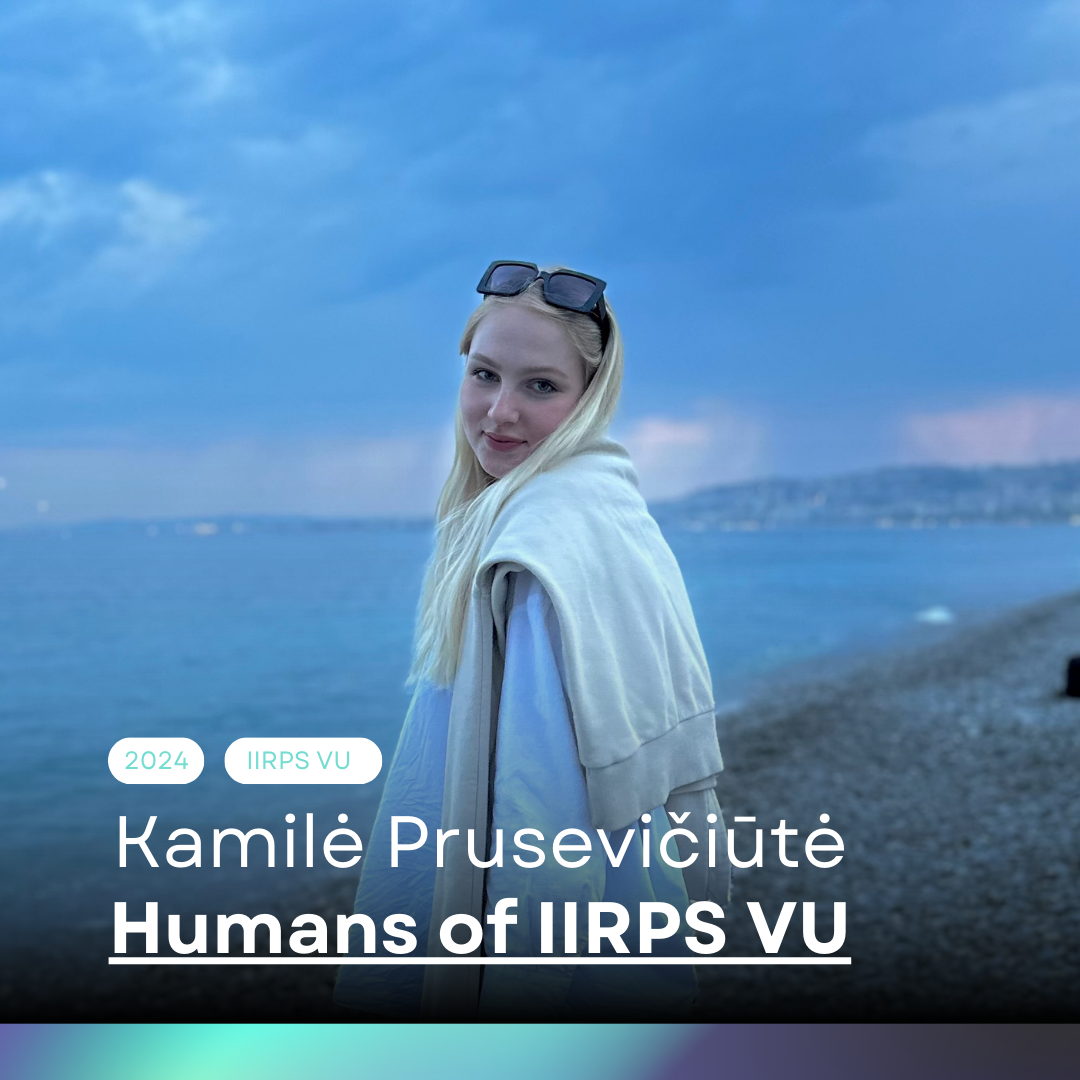How and why did you decide to study at the Institute of International Relations and Political Science at VU? Tell us about your experience studying at the institute.
From a young age, I knew that I wanted to study social sciences, although there was a time when I considered fields more closely related to health sciences, like psychology. While choosing a study path, I tried to look back at my favorite activities and school subjects – I was always an artistic and active student, part of the school journalism club, involved in student council communications, and engaged in creating artistic performances. History always fascinated me, but I only started getting interested in politics and discussing it with friends in the last years of high school.
When exploring study options, I found that disciplines like journalism or cultural anthropology seemed too narrow, and I wanted something more interdisciplinary, especially since I had many different passions and hadn’t decided on a specific field. Choosing to study at IIRPS VU immediately felt right, and since I didn’t have a strong background in politics or economics, everything was new and intriguing. Now, after more than three years, I can say that I’ve not only broadened my perspective, learned to express my opinions more freely and constructively, and gained experience in debating, but I’ve also discovered specific niches that attract me – things high-school graduate Kamile couldn’t have imagined existed.
I particularly value the third-year study modules we select ourselves. The Challenges fo Global Politics module, combined with electives such as transitional justice, regional studies (Middle East, Latin America), and development cooperation, helped me realize that I want to deepen my knowledge, gain practical experience, and pursue a career in international politics, especially in vulnerable regions. And I even managed to fulfill my curiosity about psychology by taking a BUS elective course on the subject at VU.
You’re an active fourth-year student working on your bachelor’s thesis. What is it about, and why did you choose this topic? Are you facing any challenges?
Like many fourth-year students, I’m dealing with the challenge of choosing a solid, engaging topic that will hold my interest all year and lend itself to in-depth research. My bachelor’s thesis is about the traces of French neocolonialism in former colonies Mali and Niger, which are vulnerable African states experiencing military coups and political transitions. I’m particularly exploring how this colonialist legacy affects these countries’ sovereign national identity.
During my studies, I realized how limited and Eurocentric our historical perspective from school can be, so I’ve been diving into studies of other regions, especially MENA, the Sahel, and Latin America. I became intrigued by Western orientalist perspectives, the legacy of colonialism, and the ongoing dependencies between these regions and the West. In the international relations history course, a lecture on France’s economic and military influence in Africa left a deep impression on me, sparking my interest to learn more about this region and its dynamics. Since our university doesn’t offer specific courses on African politics, I decided to make it my thesis topic.
The complexity of the region and the limited academic focus on Africa in Lithuania present my main challenges. I’m finding it tricky to narrow down the research niche and frame my research question. Although I’m only at the beginning of my thesis journey, these hurdles have already made themselves known.
You’re currently doing an internship at the Embassy of Lithuania in Paris. What does your daily work involve, and why did you choose France?
I’ve been learning French since my teenage years and have always been drawn to the French art scene. A few years ago, I also became interested in French domestic and foreign policy. In my fourth semester, I went on an Erasmus exchange at Sciences Po Lille, where I had the chance to deepen my language skills, gain more insight into French politics, and travel within France.
Since I’m considering a future in diplomacy, I wanted a firsthand look at the field, and given my French language skills and my current bachelor’s thesis on French foreign policy discourses, it made perfect sense to intern at the embassy in France. What’s more, the embassy also covers Tunisia and Morocco, which allows me to learn about these regions that interest me. The timing is perfect as well, with Lithuania’s cultural season in France this fall, involving hundreds of cultural and political events across the country.
The internship at the embassy is dynamic, with every day being different – from administrative and organizational tasks to attending conferences, events, and preparing reports. I’m also involved in defense-related activities with the defense attaché, as security topics interest me. Living in Paris and learning something new every day has been an incredible experience, and I highly recommend Erasmus internship opportunities for anyone looking to broaden their horizons.
As a very active student at the institute, what does your free time look like? Do you have time for hobbies?
I believe balance is key. Throughout my studies, I’ve always worked or interned while dedicating a lot of time to my courses, especially those that interest me most. Balancing work and studies might seem challenging, but I’m good at planning my time, and a full schedule doesn’t wear me out. Still, I think resting well is just as important as working well. To avoid burnout and fully enjoy this stage of my life, I make sure to include sports, nature walks, meet-ups with friends, concerts, art exhibits, restaurant outings, and sometimes just a peaceful night at home watching movies or simply doing nothing.
Your wish to IIRPS VU community:
We live in a rapidly changing world, where everyone around us is rushing, striving to be better and more productive. I wish for all of you to stay true to yourselves amid the whirlwind of events and emotions, spend more time on activities you enjoy, and keep a healthy balance – especially for my fellow fourth-years who are working on their bachelor’s theses.









